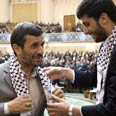
Free of hate
Sara K. Eisen advises 'pilgrims of victimhood' to learn from her Shoah-surviving grandmother
My amazing grandmother, Esther Klein, is turning 91 next month. She was in her mid-twenties when she was liberated by the Swedish Red Cross from an aimless, endless transport, after having spent several nearly lethal winter weeks in Ravensbrueck. Before that, she’d “worked” for several months in Auschwitz, after having lived for a very short time, along with her elderly parents, in a temporary tent city near her hometown of Seredna, constructed right along the railroad tracks, the better for the Jews to wait for their “ride.”
Even nearly 70 years later, it is hard for her to watch the programming for Holocaust Remembrance Day. She told me last night: “It was bad for me to watch people running. I thought I could handle it by now…”
Still, my grandmother talks about it. She lost sisters, brothers, nieces, nephews, aunts, uncles, cousins, and her parents. Those came with her into Auschwitz but not out. But she has never lost her sense of humor or her dignity or her ingenuity or her sense of morality and purpose. Those came out of the wreck just fine.
Because that is a choice. An extraordinary choice. She and the overwhelming majority of her fellow survivors moved on, brought up children the best they could, educated them, and became among the more productive members of any society they joined.
They did not teach their children to hate, but, as my grandmother puts it, “to be somebody in the world. Hate doesn’t help anybody. It just spoils everything.”
Tell that to the Pilgrims of Victimhood at Durban II in Geneva. Mass suffering of nations and races is an old scourge of humanity. It is tragic and it is worth discussing, as a world community. Preferably, grand scale human rights abuses should not be a cause to be championed by people who actually abuse their own people (like, say, Ahmadinejad) while getting very upset that others, elsewhere are being mistreated.
The politics of blame and the Free Pass for Generations of Rage granted to the underdog (again, as long as he is not your underdog) by the Third World, otherwise known these days as the UN, is not helping anyone. Except the leaders of those oppressive countries, who are pulling off some pretty nifty diversionary tactics for the benefit of their abused masses.
What if they were to instead tell people to become doctors to heal each other, lawyers to fight for their causes in the world’s courts, or film directors, to bring their stories to light? Why give your sons a gun, a black mask, and a suicide belt, when you could give him, instead, a hug and a ticket to study in Dubai? Why build bombs when you could have built a university, a hospital, or a hi-tech park? Why dig smuggling tunnels when you could instead build a subway system to take you to see relatives in Cairo?
Why is there no Palestinian or Somali or Pakistani version of the JNF or Hadassah? There would certainly be enough Euros in aid and Saudi oil dollars coming in to fund them, if anyone local cared to organize those efforts, instead of blaming You-Know-Jew (again!) for all of the earth’s problems.
Because you have been oppressed. Because you are poor. Because you’ve had relatives killed. Are not good reasons. Not since the '40s. Not since ever, really.
I don’t know of any Holocaust survivors who entered a café in Germany or Poland circa 1946 or 1996 or 2006 and blew themselves up to liberate their family’s land or business stolen by the Nazis. Nor do I know of any Holocaust remembrance conferences where the chief subject is hating Hitler and his SS and the German and Polish and Hungarian people who kept quiet. The subject is remembering the dead and the lost. And how we’ve moved on. Grown, beyond survival. Celebrating the fact that Hitler ultimately failed miserably, precisely because he did not manage to infect his victims with the thing that drove him: Hate.
My grandmother was poor when she arrived in the US. And oppressed. She had almost no one left in the world and hasn’t smelled a thing since the day they told her what that smoke was coming out of the chimneys back in Auschwitz.
Obviously, however, she had read the “welcome sign” on the gate. It said, horribly: Work makes you free. So she worked… on herself. On remembering her dead but forgetting about revenge or about stewing in what she’d lost. She worked on raising a moral, productive, educated family. On “living her best life.” She worked 12-hour days alongside my grandfather to feed their kids when there was no one alive to call for a loan.
And she is free. Free of hate. And free to see her grandchildren and great-grandchildren flourish in free countries. Marinating oneself or one’s nationhood in suffering, even if it is legitimate and documented, is not the way to gain freedom. That is the way to stay oppressed forever. Encouraging growth and forward movement is – and has always been – the only way out of a national or individual hole.
I would set up a meeting for Ahmadinejad to learn something from my Grandma. But he says she doesn’t exist.
Sara K. Eisen, an Israel-based writer, editor and web consultant, blogs at www.the-word-well.com, where this article appears in its entirety










